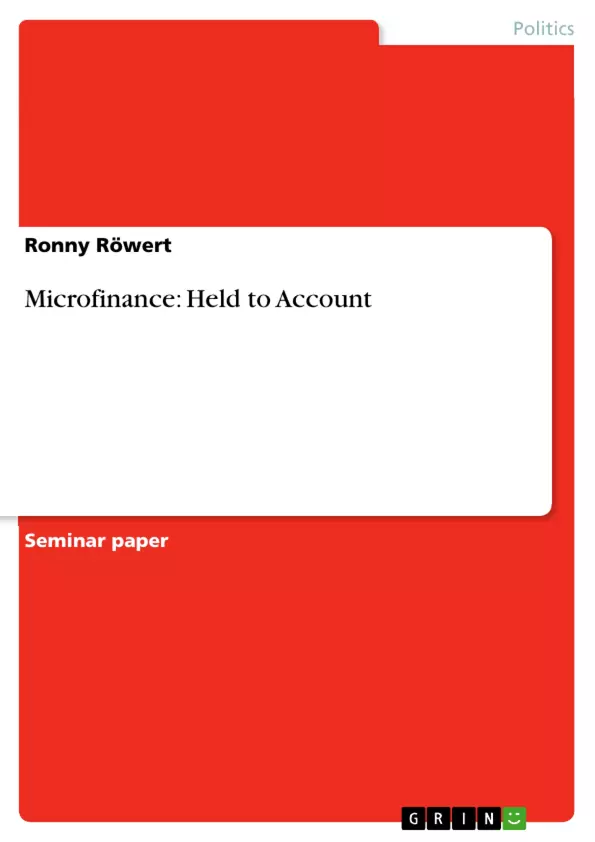Only few recent ideas have generated as much enthusiasm for poverty alleviation in countries of the southern hemisphere as the idea of microfinance. It promises both the provision of costeffective banking services to poor households and lifting people out of poverty through microenterprise development and self employment (Murdoch, 1998). Success stories, such as the granting of the Nobel Peace Prize to Muhammad Yunus and the Grameen Bank in 2006, are being broadcasted around the world. Although evidence for the role of microfinance in poverty alleviation remains highly contested, especially due to recent media coverage about suicides among borrowers (Biswas, 2010), advocates of these programs
still insist on its continuation. Marguerite Robinson, author of The Microfinance Revolution, states that, despite ups and downs and some setbacks, “it seems like the idea of sustainable finance for the poor is here to stay” (MCS, 2001, p. 5). By having successfully established the key tenet that an estimated 2.7 billion poor people worldwide are in need of access to formal financial services (World Bank, 2011), the industry’s practices are almost exclusively
criticized by positivist approaches without questioning its underlying assumptions. Due to its hegemonic appearance, it is reasonable to state that “microfinance is everywhere” (Roy, 2010,
p. 22). This essay aims to question the concept of microfinance itself as being common sense.
By adopting a poststructuralist attitude, it is possible to uncover and expose these reigning assumptions (Agarwal, 1996). In this sense, this analysis attempts to reveal this example of “establishment of truth” (Foucault, 1975, p. 184) because we not only govern others and ourselves according to these powerful truths but truth is also produced through the way we govern others and ourselves (Dean, 2010). The first section provides a brief overview of the extent to which microfinance has entered the global stage and afterwards, it tries to contextualize this idea within the emergence of advanced liberal government and millennial
development. The subsequent section aims to show the hegemonic features of microfinance, especially through the control of knowledge through the CGAP initiative, before continuing
with an in-depth study of different contradictions of empowerment as a major feature of microfinance. The final part summarizes the results by highlighting the mechanisms through which microfinance governs its recipients.
Inhaltsverzeichnis (Table of Contents)
- Introduction
- Microfinance as the ‘panacea of choice'
- The emergence of microfinance
- Millennial development and the rise of microfinance
- The colonization of microfinance
- The role of the Consultative Group to Assist the Poor (CGAP)
- The hegemonic features of microfinance
Zielsetzung und Themenschwerpunkte (Objectives and Key Themes)
This essay examines the concept of microfinance as a dominant force in the field of development studies, exploring its emergence, spread, and underlying assumptions. By adopting a poststructuralist approach, the essay aims to uncover and challenge the prevailing truths and hegemonic structures associated with microfinance. The key themes explored include:- The historical context and emergence of microfinance
- The role of advanced liberal government and millennial development in shaping microfinance
- The institutionalization of microfinance and the influence of the CGAP
- The hegemonic features of microfinance and its impact on knowledge and practice
- The inherent contradictions within the concept of empowerment as it relates to microfinance
Zusammenfassung der Kapitel (Chapter Summaries)
Introduction
This section sets the stage by highlighting the widespread enthusiasm for microfinance as a solution to poverty. It emphasizes the contested nature of microfinance, particularly in light of recent controversies surrounding its impact on borrowers. The essay then introduces a poststructuralist approach to examine the underlying assumptions and hegemonic structures of microfinance.Microfinance as the ‘panacea of choice’
This chapter explores the historical context of microfinance, tracing its origins to the 1970s and its subsequent rise as a prominent development strategy. It examines the broad consensus on microfinance as an accepted practice to address the financial needs of the poor, despite its controversial aspects. The chapter also introduces the concept of “advanced liberal government” and millennial development, highlighting how these concepts contributed to the emergence of microfinance.The colonization of microfinance
This section focuses on the institutionalization of microfinance through the Consultative Group to Assist the Poor (CGAP). It examines how CGAP, housed within the World Bank, has established a dominant narrative about microfinance, promoting a particular model and shaping global understanding of the practice. The chapter further explores the hegemonic features of microfinance, emphasizing its control of knowledge, standards, and norms.Frequently Asked Questions
What is the central promise of microfinance?
Microfinance promises to alleviate poverty by providing cost-effective banking services and enabling self-employment through micro-enterprise development.
Why does this essay adopt a poststructuralist approach?
A poststructuralist attitude allows the author to uncover and challenge the "established truths" and underlying assumptions of the microfinance industry that are often taken for granted.
What is the role of the CGAP in the microfinance industry?
The Consultative Group to Assist the Poor (CGAP) acts as a hegemonic force, controlling knowledge and standards to shape how microfinance is understood and practiced globally.
Are there criticisms regarding the impact of microfinance on borrowers?
Yes, the essay mentions that the role of microfinance in poverty alleviation is highly contested, citing media coverage of suicides among borrowers as a significant concern.
What are the "contradictions of empowerment" mentioned in the text?
The analysis reveals that while microfinance claims to empower the poor, it often functions as a mechanism to govern and control recipients according to liberal economic truths.
- Quote paper
- Ronny Röwert (Author), 2011, Microfinance: Held to Account, Munich, GRIN Verlag, https://www.grin.com/document/184469



